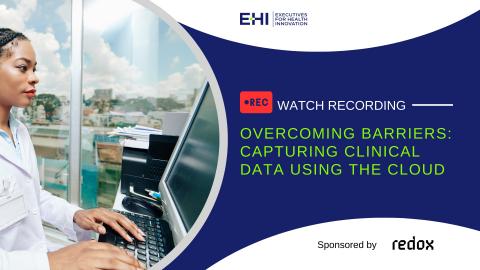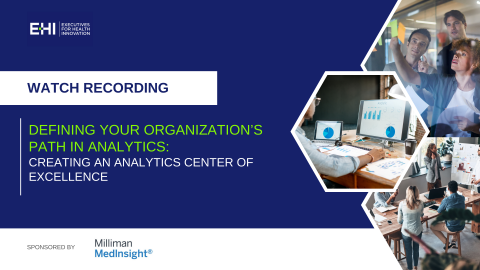Topic intro description here. Limited to 145 characters. Topic intro description here. Limited to 145 characters. Topic intro description here.
WEBINAR - Digitizing the Consumer Healthcare Journey
Today’s consumer expects to be able to do everything online but the demand for digital convenience is still not being met by most healthcare providers. The economics of health systems are at risk. The only way forward is to shift how consumers find, book, and pay for their care.
Webinar: Overcoming Barriers: Capturing Clinical Data Using the Cloud
Overview
Cloud has been widely adopted across many industries. Gone are the days of fragmented legacy IT systems. Data is now on-demand analytics, and easily accessible and actionable through the cloud.
However, of all the industries, healthcare is lagging due to shaky confidence in cloud data security and a lack of financial incentives in a fee-for-service reimbursement model. With value-based care models becoming increasingly more common and incentivized, requiring providers to build longitudinal views of their patients, challenges have shifted – providers are becoming less hesitant to make the transition to the cloud.
With that in mind, strategies can't be fully executed if critical data is still trapped in legacy systems and EHRs. Watch leading providers address the challenges of connecting data from EHRs and other legacy systems to the cloud.
Speakers:
- James Buntrock, Vice Chair, Information Technology, Mayo Clinic
- Mitch Kwiatkowski, Chief Data and Analytics Officer, Marshfield Clinic Health System
- Anand Saokar, Head - Omnichannel, Consumer Analytics & Enterprise Data Platform, Wellstar
Sponsored by:

Webinar: Defining Your Organization’s Path in Analytics: Creating an Analytics Center of Excellence
Overview
What is an Analytics Center of Excellence? It is a framework for thinking about data and creating a culture built around defined goals and agreed-upon outcomes. Healthcare organizations are in need of timely insights, effective storytelling, data literacy training, trust, disciplined data infrastructure, scalable data modeling, and simple tools.
MedInsight’s Will Fox and Melody Craff offer ideas on building this business capability and strengthening the use of analytics in your organization to gain a competitive edge.
During this webinar, you will learn about:
- Evaluating the current state
- Assembling a data team
- Benefits of creating an analytics center of excellence
- Pitfalls to avoid in the process
Featured Speakers:
- Melody Craff - Vice President, Strategic Analytics and Education, Milliman MedInsight
- Will Fox, Chief Actuary, Milliman MedInsight
Sponsored by
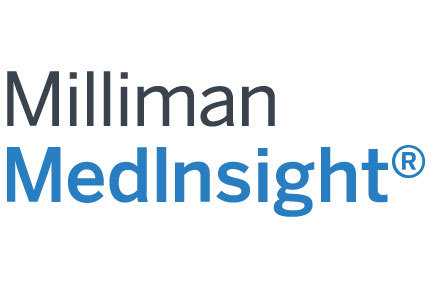
Webinar: Defining Your Organization’s Path in Analytics: Creating an Analytics Center of Excellence
MedInsight’s Will Fox and Melody Craff offer ideas on building this business capability and strengthening the use of analytics in your organization to gain a competitive edge.
Webinar: Ensuring Provider Data Isn’t the Source of Surprises
The No Surprises Act (NSA) which went into effect on January 1, 2022, provides consumers federal protections from unexpected medical bills. One of the provisions of the No Surprises Act requires health plans to update their provider directories more frequently. This gets to the root cause of surprise billing, which is patients’ ability to easily identify which providers are in-network. If payers can update their directory in just 48 hours, as the law mandates, patients will have a much better chance of finding care that’s actually covered by their plans.
WEBINAR: Providers Ditch Paperwork & Reduce Burden with AI
While healthcare organizations have been under tremendous financial stress during the COVID-19 pandemic, a recent United healthcare survey shows that 56% of healthcare organizations reported accelerating their artificial intelligence (AI) plans. Since the pandemic struck, investment in AI platforms has skyrocketed. In this webinar, we heard what is driving the current AI investments including cost savings, improved provider and patient experiences, reducing staff burnout and administrative burden.
- Learn how a cutting-edge platform uses AI and RPA to quickly eliminate repetitive operational tasks at scale by using existing administrative processes and applications (i.e. EHR, web-based apps)
- Hear experts discuss how healthcare organizations are investing in AI and automation technologies to cut costs, reduce staff burn-out, create resilience, and enhance the employee and patient experience
Virtual Roundtable: Combatting COVID-19 With Data Analytics
eHI, along with featured partner Booz Allen Hamilton, discuss four innovative, sustainable, and effective strategies to combat the challenges of using health data and modeling to address the response to the COVID-19 pandemic. Booz Allen will share the success of its COVID-19 Safe Return Simulator, which integrates system dynamics and agent-based modeling to study the spread of COVID-19.
The COVID-19 Safe Return Simulator is intended to save and improve lives and improve social conditions by providing local, state, and national leaders with the statistically-sound projections they need to make confident, data-driven decisions on how and when to ease COVID-19-related restrictions.
Watch the video from the event.
Speakers:

Brian Albert
Lead Associate, Strategic Innovation Group, Booz Allen Hamilton
Brian Albert has an extensive history of political and federal government experience. He has served an Advisor to the Assistant Secretary for International Affairs and the Regional Affairs Specialist (Office of International Affairs) at the U.S. Department of Homeland Security, as well as a Policy Advisor to the Commissioner at the U.S. Customs and Border Protection Agency. He has also worked in political campaigning.
Brian holds a B.A. in International Relations and Affairs from the University of Vermont, an MBA from IPADE Business School in Strategy and Organizational Design, and an MBA from Northwestern University’s Kellogg School of Management.
 Ryan Ashcraft
Ryan Ashcraft
Principal, Counterpointe Solutions Inc.
Ryan Ashcraft serves as the Principal at Counterpointe Solutions Inc. He is a technology consultant specializing in large system development, enterprise technology strategies, service-oriented architecture, model driven development techniques, and agile software development lifecycle (SDLC) practices. Prior to that, he was a Lead Associate for Booz Allen Hamilton, an architect at Number Six Software, and a senior consultant at AMS.
Ryan holds a BS in computer sciences and economics from Vanderbilt University.

Jennifer Covich Bordenick
CEO, eHealth Initiative and Foundation
For over 20 years, Jennifer has focused on quality and innovative technology solutions to transform healthcare. As CEO, she provides leadership for research, education and advocacy components of eHealth Initiative and Foundation (eHI). Convening senior executives from every group in healthcare to discuss, identify, and share best practices that transform the delivery of healthcare. Focus areas: improving health and wellness through innovative solutions; interoperability; privacy concerns; artificial intelligence; payment models to support innovative care; and tech tools for chronic care. She led development of dozens of national surveys and published groundbreaking reports. As part of her work with the Foundation, she led grants with California Health Care Foundation, Commonwealth Fund, Aetna Foundation and Bristol Meyers Squibb Foundation. Jennifer is co-chair of the Federal HIT Policy Committee’s Strategy and Innovation Workgroup; member of the HL7 Board of Directors; and a member of the Diabetes Collaborative Stakeholder Panel. Jennifer is a faculty member for the MHA and MHIA graduate programs at George Washington University. Prior to joining eHI, Jennifer headed up the strategic marketing at OpenNetworks, Inc., focusing on security solutions for the healthcare industry. She led healthcare industry relations at MicroStrategy, Inc., focusing on data-mining solutions for the pharmaceutical and healthcare industry. She spent four years at the National Committee for Quality Assurance as Director of Policy and Product Development, helping develop national quality standards for healthcare organizations. Jennifer began her career at the George Washington University Hospital, Medical Center and Health Plan working on quality management initiatives, clinical pathways and healthcare administration. Jennifer earned a master's in Human Resource Development, completed coursework in health administration doctoral program at GWU, and resides in Maryland with her husband and two children.

Austin Hagerty
Chief Data Scientist, Booz Allen Hamilton
Austin serves as the Chief Data Scientist for Booz Allen Hamilton. In this role, he has overseen and grown the data science market in Austin, TX, setting strategy for the region. He has led an internal investment effort to develop a generalizable natural language classifier (NLC) for the healthcare industry. The model was built using advanced deep learning techniques on an NVIDIA DGX GPU server and as part of the firm’s core healthcare AI offerings. He has also supported a contract with at the Veterans Affairs, providing data and analytics services to multiple divisions. He designed and drove a transformation effort to establish their technology platform.
He has worked as the Senior Manager, Data Science for XPO Logistics, and the Assistant Director, Workforce Data and Analytics at Northwestern Mutual. Prior to that, he was the Data Architecture and Infrastructure Program Manager at IBM.
Austin holds a BA in art history and a MS in data science from the University of Wisconsin, as well as multiple professional certifications. He has taught at the University of Texas at Austin and the University of North Carolina, Charlotte.

John Larson
SVP, Booz Allen Hamilton
John Larson is a leader in Booz Allen’s digital, analytics, and strategy practice serving civil and commercial clients. He leads the architecture and execution of analytic solutions providing analytic strategy advisory services; fraud, waste, and abuse detection and mitigation; and artificial intelligence and deep learning services.
For more than 20 years, John has been a champion and early adopter of advanced analytic solutions within the Federal Government, energy and natural resources, chemicals and refined products, transportation, healthcare, and social welfare and pension programs. He has helped develop transformative and innovative solutions for federal clients. For example, at the Centers for Medicare and Medicaid Services, he pioneered algorithmic fraud detection for fiscal intermediaries and at the Social Security Administration, he reshaped the disability insurance program’s administrative burden with predictive modeling methods.
Prior to joining Booz Allen, John led advanced analytics initiatives and drove enterprise-wide innovation at IHS Markit creating products and consulting solutions in the oil and gas, automotive, and maritime industries. He is a recognized expert in analytic techniques such as predictive modeling, Bayesian statistics, natural language processing, and classification and clustering.
John holds a double B.A. in economics and history, and a master’s in public policy, both from The College of William and Mary.
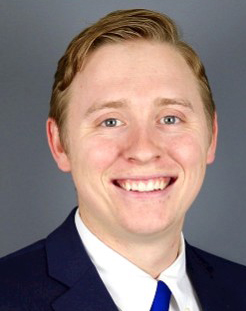
Cameron Mineo
Lead Scientist, Booz Allen Hamilton
Cameron came to Booz Allen as a summer analyst, focusing on their Aerospace Data Analytics Account, creating analytics-web based applications. He then moved from Scientist to Lead Scientist and Technical Lead quickly thereafter and serves as a senior consultant in Aerospace. Cameron holds a BS in chemical and biomolecular engineering with a concentration in molecular and cellular biology from Johns Hopkins University. He also has a business analytics graduate certificate from Indiana University’s Kelley School of Business.
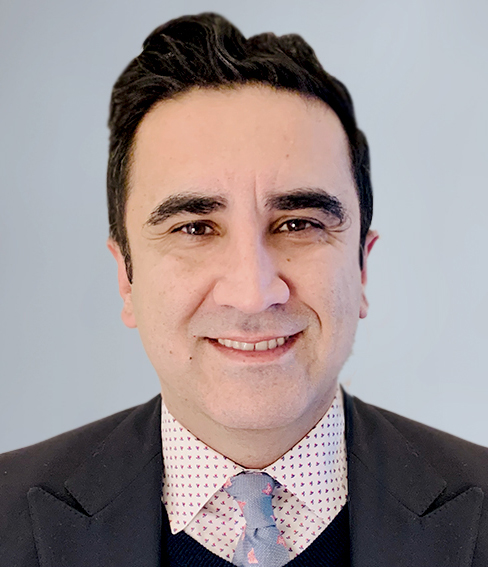
Dr. Amir Mokhtari, Ph.D.
Chief Scientist and Senior Associate, Booz Allen Hamilton
Dr. Mokhtari comes to Booz Allen Hamilton with a tremendous background in risk analysis. He develops probabilistic models to solve complex risk assessment problems, leading technical teams from design requirements through implementation and software testing.
His areas of expertise specific to risk characterization of chemical and microbial hazards in the food supply chain include: ranking and prioritization of food commodities and hazards; optimal, risk-based allocation of resources; and multi-attribute decision making involving health, feasibility, and economic criteria. He develops innovative modeling approaches to compare intervention strategies intended to reduce the transmission and, ultimately, the burden of disease associated with infectious pathogens.
Dr. Mokhari served as Senior Data Scientist/Risk Modeler at the FDA, and was a TitleORISE Fellow at the FDA-CFSAN. Prior to that, he was the Senior Risk Analyst for both Neptune and Company and RTI International.
Dr. Mohkari was a Postdoctoral Fellow at North Carolina State University, where he earned his Ph.D. in environmental engineering. He holds a MS in Hydraulic Structures and a BA in civil engineering from the University of Tehran.
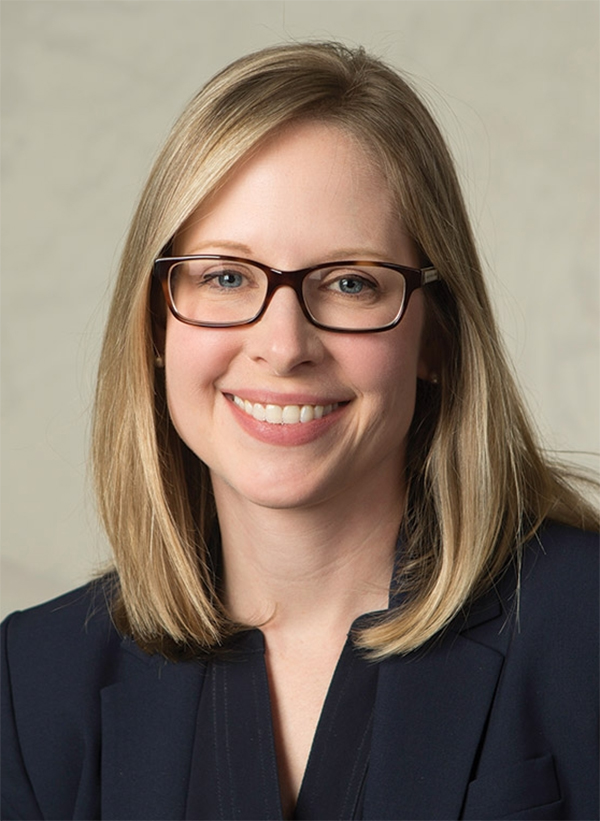
Dr. Lauren Neal, Ph.D.
Principal, Booz Allen Hamilton
Dr. Lauren Neal is the founder of the Booz Allen Women in Data Science group. She has more than 15 years of experience in the life sciences industry with a focus on creating and delivering data science and artificial intelligence to accelerate precision medicine innovation. She serves at the capability lead for wearables and client engagement across multiple federal health clients, including the U.S. Food and Drug Administration, the National Institutes of Health, and military health organizations.
Lauren has a Ph.D. in biomedical engineering from the Johns Hopkins School of Medicine, and a BS in electrical engineering from the University of Pennsylvania.

Dr. Samuel V. Scarpino, Ph.D.
Assistant Professor, Network Science Institute
Northeastern University
Samuel V. Scarpino, Ph.D. is an Assistant Professor in the Network Science Institute at Northeastern University. At Northeastern University, he directs the Emergent Epidemics Lab. Scarpino has 10+ years of experience translating research into decision support and data science/AI tools across diverse sectors from public health and clinical medicine to real estate and energy. For his contributions to complex systems science, he was made an External Faculty member of the Santa Fe Institute in 2020.
Scarpino has given over 100 keynote, invited, and professional presentations at international conferences, and has published peer-reviewed articles in Science, Nature Medicine, PNAS, Nature Physics, and many other prestigious journals. His expert commentaries have appeared in publications such as: Nature, Science, PNAS, and Nature Physics. His research on infectious diseases has been covered by the New York Times, Wired, the Boston Globe, NPR, VICE News, National Geographic, and numerous other venues.
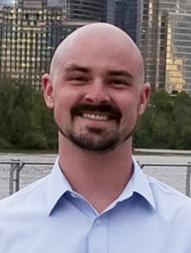
Jesse Tetreault
Solutions Architect, Healthcare
NVIDIA
In his role as the Deep Learning Solutions Architect for Healthcare at NVIDIA, Jesse advocates for Deep Learning and Accelerated Computing in healthcare using GPU computing. He was an instructor at the Foundation for Advances in the Sciences (FAES) at NIH, where he co-instructed BIOF399 “Deep Learning for Medical Image Architecture” in the graduate school. He was a graduate research assistant teacher and teaching assistant at Clemson University, focusing on deep learning for computer vision with emphasis on scenarios encountered in autonomous driving. He also provided support for courses in programming and high-performance computing with GPU’s, and led projects on multiple facial recognition algorithms in parallel, and co-led projects in deep learning and big data. Previously, he was an intern at R&D Systems Engineering in Qualcomm and worked in Software Engineering at The Aerospace Corporation. He holds a BS and an MBA in computer engineering from Clemson University.
Data Analytics/SDOH Workgroup
Discussion on how ICD-10 coding can help improve the process of identifying SDOH to connect patients directly to resources in their communities.
Webinar Recording and Feedback Opportunity Available: Advancing Technology for Quality Reporting at CMS - Burden Reduction and FHIR
Webinar Recording and Feedback Opportunity Available: Advancing Technology for Quality Reporting at CMS - Burden Reduction and FHIRThe Centers for Medicare & Medicaid Services (CMS) recorded a presentation on how the Fast Healthcare Interoperability Resources® (FHIR) standard can be used to advance technology to reduce quality reporting burden and increase interoperability for our healthcare community. This presentation discusses the journey to FHIR for quality, the benefits of FHIR, implementation plans for electronic quality reporting using FHIR, roadmap goals, and stakeholder readiness. CMS also recently collaborated with Health IT Vendors to conduct a pilot implementation of FHIR for quality with a vision to streamline the future of quality submissions across our programs and will share pilot results and next steps. The webinar recording ‘Advancing Technology for Quality Reporting at CMS: Burden Reduction and FHIR’ can be found on YouTube and slides are available on the Electronic Clinical Quality Improvement (eCQI) Resource Center. The presentation focused on these learning objectives:
CMS invites you to provide feedback by responding to a FHIR Readiness Poll by Friday, August 31, 2020. *Please note, the webinar recording states to provide feedback by August 8, but the feedback opportunity has been extended to August 31. Submit FHIR-related questions to the eCQI Resource Center team at ecqi-resource-center@hhs.gov. Find information about FHIR and other standards on the eCQI Resource Center. |
WEBINAR: Complete Patient Data – A Key Element to New York’s Response to COVID-19
In today’s digital age, our connectivity gives us a strong advantage in fighting infectious disease. Advanced technology gives us the ability to analyze data across communities, regions, and state lines to identify outbreaks, and predict future movement to help those most at risk. Collaborating and sharing data to provide real-time guidance and enable research is the key to better understand and control COVID-19.

